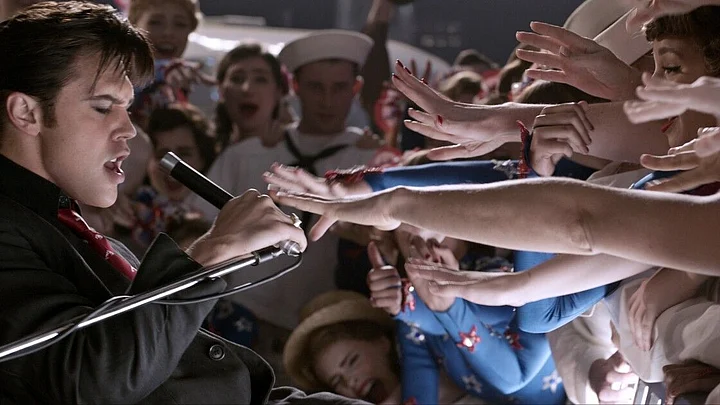"When things become too dangerous to say.... sing."Elvis Presley
Elvis is an out and out Baz Luhrmann film. It's loud and flashy, where even the Warner Bros logo is bejeweled and gilded. This is not a sensitive portrayal of Elvis, it is too careful in its approach.
The movie has a very interesting beginning. It starts with Presley's conniving manager Andreas Cornelis van Kuijk (Tom Hanks), a Dutch carnival manager who awarded himself the name and rank of Colonel Tom Parker when he sneaked into the United States, narrating the story about how he discovered the singer and presented a gem to the world.
Parker, who was accused of exploiting Presley, not letting him tour abroad and tying him down in a cash-cow Vegas residency, tells the viewers that he shouldn't be branded the villain of the piece.
Parker then reminisces Elvis's career. He hears Elvis' (Austin Butler) debut single, 'That's All Right', and is shocked to learn that it has been sung by a white boy. He then tracks down the skinny teenager to a country show, and sees him transform from a shy kid to a sex god with his pelvic thrusts and deep voice. Parker then becomes the 'snowman' for Elvis, sweet-talking into entering a partnership with him, resulting in hit music records and Hollywood offers flooding in.
We also get glimpses of Elvis' childhood in Mississippi and Tennessee, where his mother had to toil day and night after his father Vernon (Richard Roxburgh) was jailed for forging a cheque.
The story is narrated in the typical Luhrmann-esque fashion- the story moves back and forth in a manic pace and is peppered with glitzy exuberance.
The rapid success of Elvis, the singer helping women express their desires, the decision to calm moral-majority fears by doing two years military service in Germany, marriage to Priscilla (Olivia DeJonge), the short stint in films, the televised 1968 Comeback Special and finally his goodbye- Elvis touches upon the widely publicised aspects of the icon's life, but shies away from delving into the mess he was.
Elvis primarily focuses on Elvis Presley's struggle to embrace the natural rebelliousness he had been blessed with and Parker's constant obsession to control him. However, the film never really explores their complicated relationship. Parker is reduced to this whiney old man, who constantly justifies every action of his. His life after Elvis' death and his demise are just passing mentions in the closing credits.
Tom Hanks tries his best to breathe life into Parker, but a film solely on this dubious character, with Elvis taking a backseat, would have been a fascinating watch.
There's also nothing new that Baz presents about Elvis' life. Austin Butler does an outstanding job as the feverishly hip-shaking King of Rock and Roll. On stage, during the ferocious concert scenes, Austin manages to bring out the manic energy that drove fans crazy.
When he flashes a smile at the audience or comes dangerously close to them, we see how much he was adored. But off stage, we get to know nothing about the singer. What did he think about his friends? What were his political inclinations? What role did his wife play in his life? Little Richard and BB King, who were major influences in Elvis' life, make insulting blink-and-miss appearances.
They are merely used as props to hammer into our heads that Elvis was indebted to black musicians. A number of significant things have been erased from the biopic. What about the legendary encounter with Richard Nixon, the one US president Elvis admired? Or his relationship with Ann-Margret, his Viva Las Vegas co-star?
The film definitely has its moments. For instance, Elvis did touch a chord with gay men as well as straight women in the States. However, a film about one of 20th century's most electrifying and controversial performers, can't be incurious in nature.
(At The Quint, we question everything. Play an active role in shaping our journalism by becoming a member today.)
